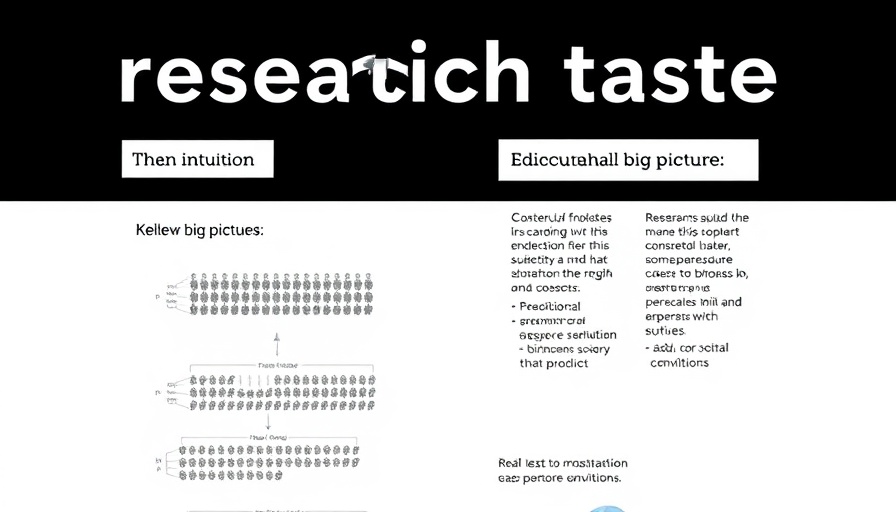
Understanding Research Taste: Key Insights for Business Professionals
Navigating the intricate world of research can be daunting, especially for CEOs and marketing managers steeped in rapidly shifting tech-driven industries. The concept of "research taste"—the innate ability to discern promising research directions from unfruitful ones—may seem elusive, yet it is essential for making informed decisions. In this exploration, we will unpack what research taste is, its origins, and practical ways to cultivate it.
Defining Research Taste: More than Just a Gut Feeling
Research taste goes beyond merely identifying an interesting core problem. It encompasses an array of critical decisions made throughout the research process. From selecting research topics to evaluating which anomalies merit investigation, taste guides researchers in moments that are often ambiguous and open-ended.
For instance, seasoned researchers may have strong intuitions about which experiments might yield insightful results versus those likely to lead to inconclusive outcomes. Essentially, research taste can be likened to a set of heuristics developed through experience, allowing researchers to navigate complexities with confidence.
How Research Taste is Cultivated Over Time
It's completely normal for newcomers to research to feel as if they lack a refined taste. Just as one might train a neural network, developing research taste requires exposure to diverse and high-quality research experiences. This process includes learning from real outcomes—both successes and failures—and accumulating intuitions that refine decision-making ability.
Identifying your research strengths and weaknesses is key. Regularly engaging with peers and participating in discussions can broaden a researcher's perspective, helping them gain exposure to various methodologies and viewpoints. The more informed decisions you encounter, the more robust your research taste will become.
Practical Tips to Enhance Your Research Taste
To nurture your research taste, consider implementing the following strategies:
- Seek Feedback: Consistently provide and solicit constructive feedback in research discussions. This not only helps refine your thinking but also exposes you to alternative viewpoints.
- Diversify Your Reading: Engage with literature across varied disciplines. Exposure to different thought processes can spark innovative ideas and strengthen your analytical skills.
- Reflect on Past Projects: Regularly evaluate previous research findings. Understanding what worked and what did not can significantly sharpen your intuition for future endeavors.
Embracing Ambiguity in Research Decisions
A hallmark of seasoned researchers is their ability to make decisions in uncertain environments. Accepting that not every research path will lead to clear outcomes is vital. Instead of seeking absolute clarity in each step, embracing uncertainty often leads to serendipitous discoveries.
Your ability to engage creatively with ambiguity can also open new avenues for exploration. Consider brainstorming sessions with diverse teams where all ideas are welcomed. This fosters an environment where research taste can flourish.
The Impact of Research Taste on Business Strategy
For CEOs and marketing professionals, the benefits of honed research taste extend beyond simple research projects. It influences strategic decision-making and can enhance overall business outcomes. Cultivating an understanding of research dynamics allows leaders to anticipate market trends and adapt to evolving consumer behaviors effectively.
By instilling a strong research culture within their organizations, leaders can ensure that their teams develop the nuanced insights necessary to navigate complexities in business sectors, ultimately driving innovation and competitive advantage.
Future Predictions: Trends in Research Methodologies
As industries become more data-driven, relying on robust research methodologies will prove paramount. The rise of artificial intelligence and machine learning will further reshape how research is conducted, shifting the landscape and prompting researchers to embrace more agile and interactive research frameworks.
Organizations should invest in appropriate training programs to equip their teams with the necessary skills to thrive in this evolving environment. Organizational commitment to cultivating research taste will undoubtedly pay dividends, turning insights into impactful actions.
In conclusion, developing research taste is vital for success in today’s business environment. By enhancing this skillset, professionals can better navigate the nuances of research and translate findings into actionable strategies. Embrace the journey toward refining your research taste and recognize the significant advantages it presents for both personal and organizational growth.
Take Action: Cultivating your research taste can substantially influence your professional trajectory. Begin your journey today by seeking diverse learning opportunities and engaging with fellow researchers to broaden your insights and decision-making capabilities.
 Add Row
Add Row  Add
Add 




 Add Row
Add Row  Add
Add 

Write A Comment